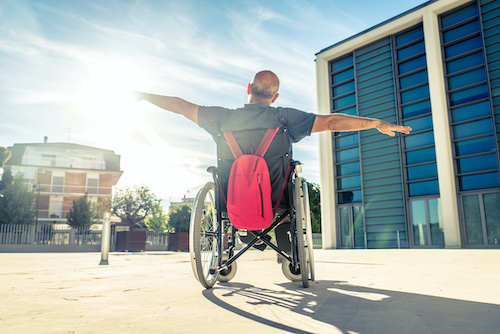
In a world where physical mobility is often taken for granted, it’s easy to overlook the profound impact it has on our mental health and well-being. For many individuals, the ability to move freely, navigate their surroundings, and maintain a sense of independence is not just a convenience; it’s a fundamental aspect of their quality of life. This is particularly true for those who have discovered the life-changing potential of mobility solutions.
As we explore the relationship between mobility and mental health, we uncover a story of empowerment, resilience, and transformation. Mobility solutions provide people with a sense of autonomy and control over their lives. They can give people with disabilities access to previously inaccessible places and help them feel independent. Mobility solutions can also provide a sense of liberation, allowing people to explore new places and make their own choices.
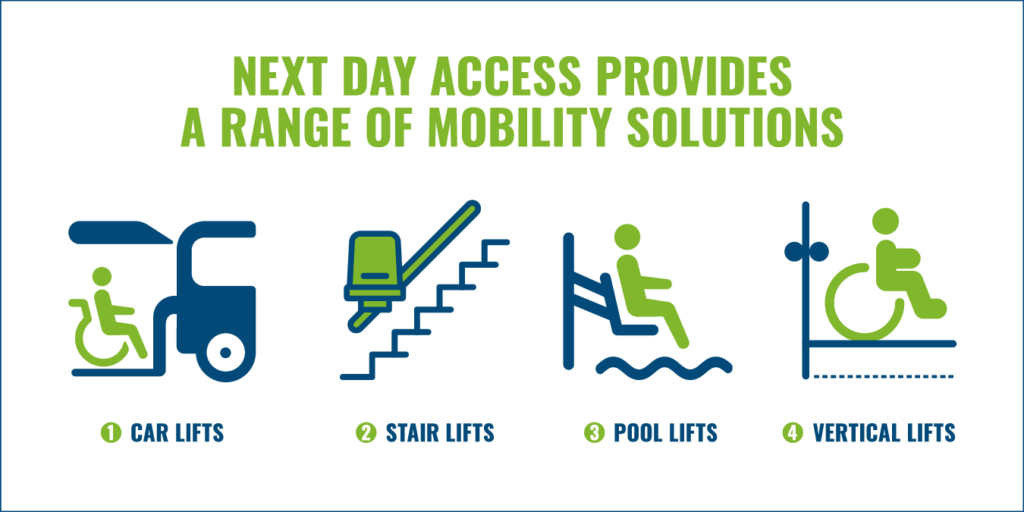
Dedicated to improving accessibility and independence through innovative solutions, Next Day Access plays a pivotal role in this narrative. Next Day Access provides a variety of products and services, including wheelchair ramps, wheelchair lifts, and other products that enable those who are physically or mentally disabled to lead more independent lives. Their commitment to creating accessible environments is inspiring and is making a difference in the lives of those with disabilities.
This article explains the psychological benefits of increased mobility, shedding light on how mobility solutions can improve mental health and overall well-being. In addition, we explore the intersection of mobility and mental health, highlighting World Mental Health Day.

Understanding the Link Between Mobility and Mental Health
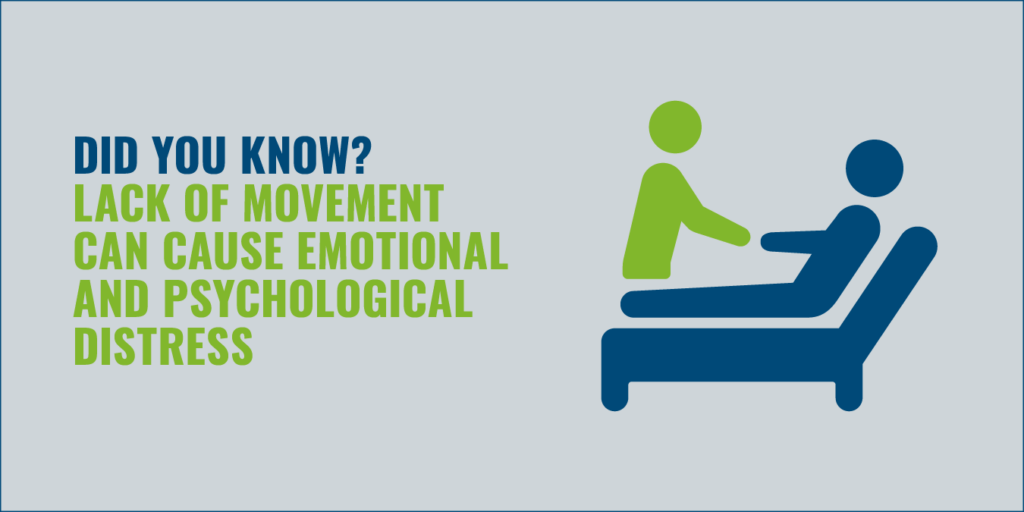
In order to understand how mobility affects mental health, you need to first understand their intricate connection. Individuals with limited mobility, whether due to aging, disability, or injury, face challenges far beyond their physical limitations. Limited movement can cause emotional and psychological distress, which can manifest in a variety of ways.
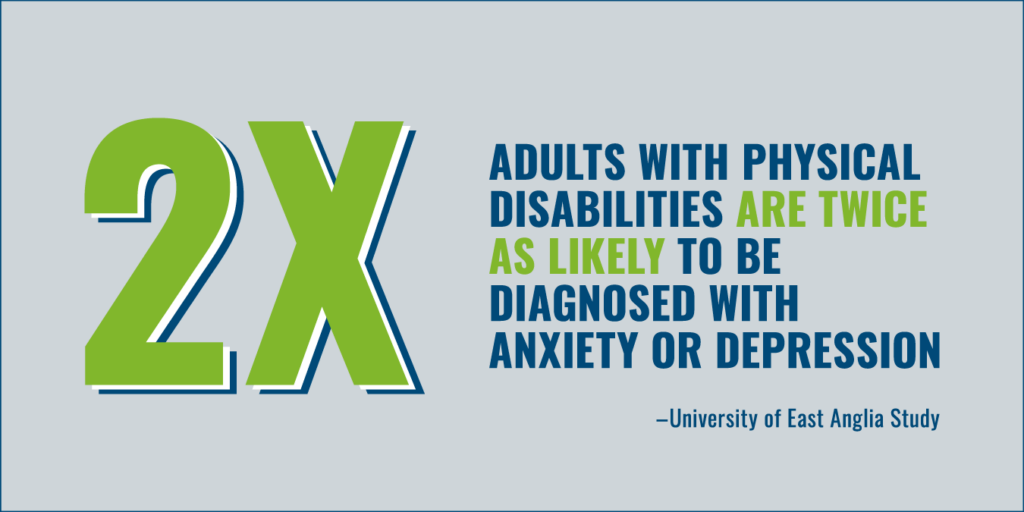
Researchers consistently show that people with limited mobility are more likely to experience mental health issues like anxiety, depression, and low self-esteem. For instance, a study by the University of East Anglia found that adults with physical disabilities were twice as likely to be diagnosed with anxiety or depression. As a result of reduced mobility, people can feel isolated, frustrated, and dependent, all of which can negatively affect their mental health.
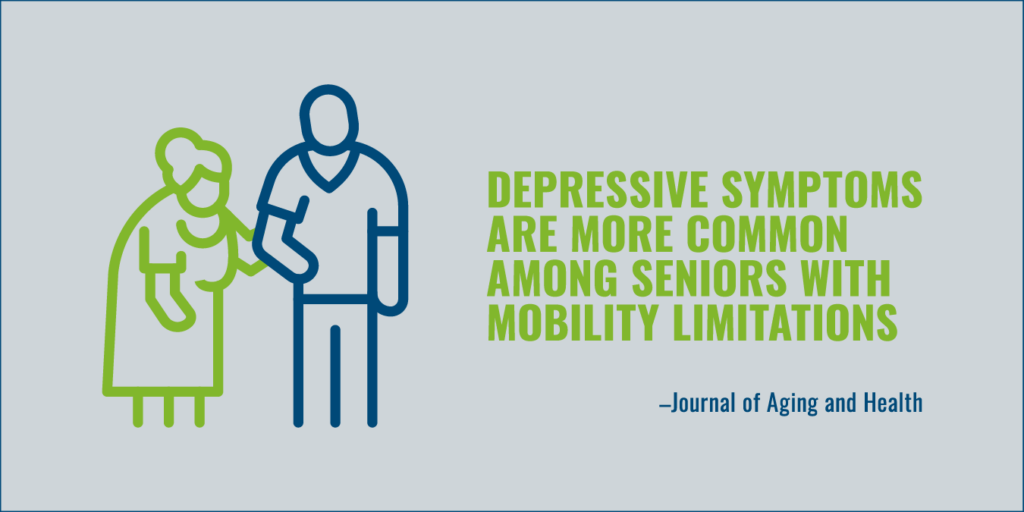
It is crucial to address reduced mobility as it is associated with mental health challenges. For example, depressive symptoms are more common among seniors with mobility limitations, according to a study in the Journal of Aging and Health. Likewise, research in the Journal of Health Psychology shows limited mobility negatively impacts self-esteem and overall life satisfaction.
Independence: A Key Driver of Psychological Well-being
Independence is a fundamental human need that impacts our psychological health beyond the physical realm. Our sense of self-worth and happiness are intrinsically tied to our ability to make choices, move freely, and engage with the world. Having limited mobility can compromise this autonomy, which can contribute to mental health issues.
The concept of independence encompasses not only the absence of physical barriers but also the restoration of choice and control over one’s life. For many individuals facing mobility challenges, a loss of independence can result in helplessness and frustration. Tasks that were once routine become daunting, and the world feels increasingly inaccessible.
This is where mobility solutions step in as powerful tools in the quest to enhance independence. By providing individuals with the means to overcome physical obstacles and regain control over their movements, these solutions nurture psychological well-being. It’s not just about facilitating physical mobility; it’s about empowering individuals to lead more fulfilling lives.
Mobility Solutions: A Path to Independence
In order to achieve independence, people with mobility challenges can choose from a wide array of mobility solutions, each tailored to specific needs. Whether it’s a stair lift for getting up and down stairs or a wheelchair ramp that bridges gaps between spaces, these solutions empower people and remove barriers.
Here are several of the most influential mobility solutions:
Stair Lifts
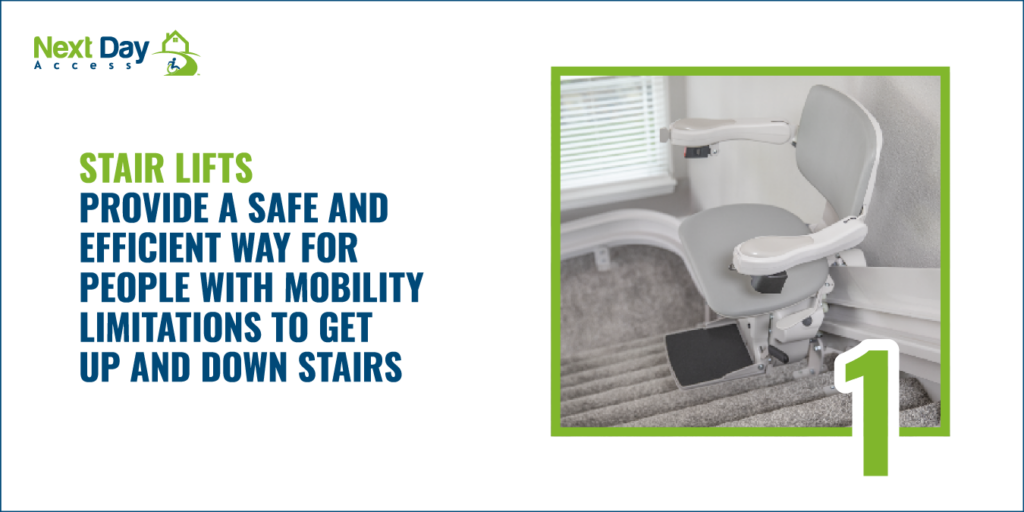
Stair lifts provide a safe and efficient way for people with mobility limitations to get up and down stairs. Getting up and down stairs can be a challenge, whether you’re old, injured, or disabled. Stair lifts remove this obstacle, allowing people to move up and down stairs easily without others’ assistance.
Wheelchair Ramps
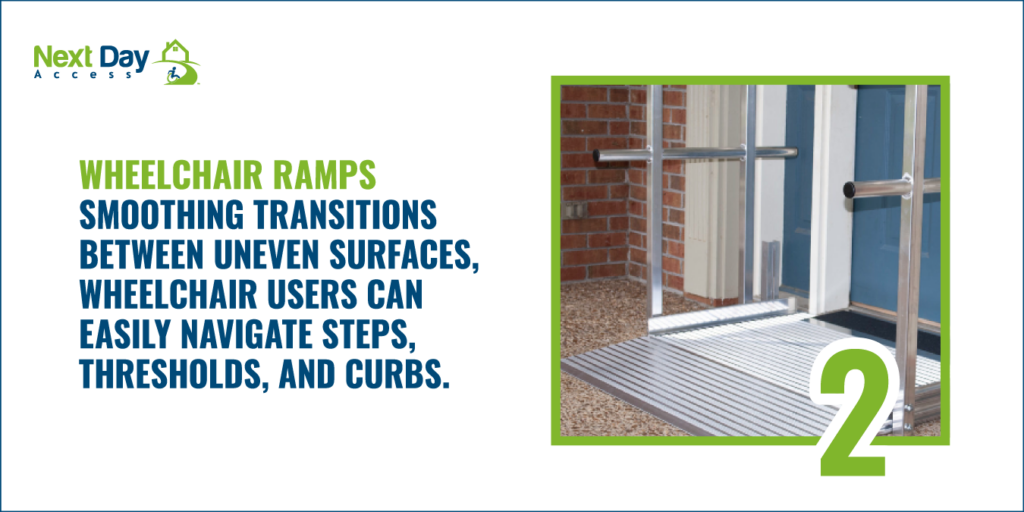
Another important part of increasing mobility and independence is wheelchair ramps. By smoothing transitions between uneven surfaces, wheelchair users can easily navigate steps, thresholds, and curbs. Besides being physically accessible, ramps give people a sense of freedom and confidence.
Accessibility Equipment
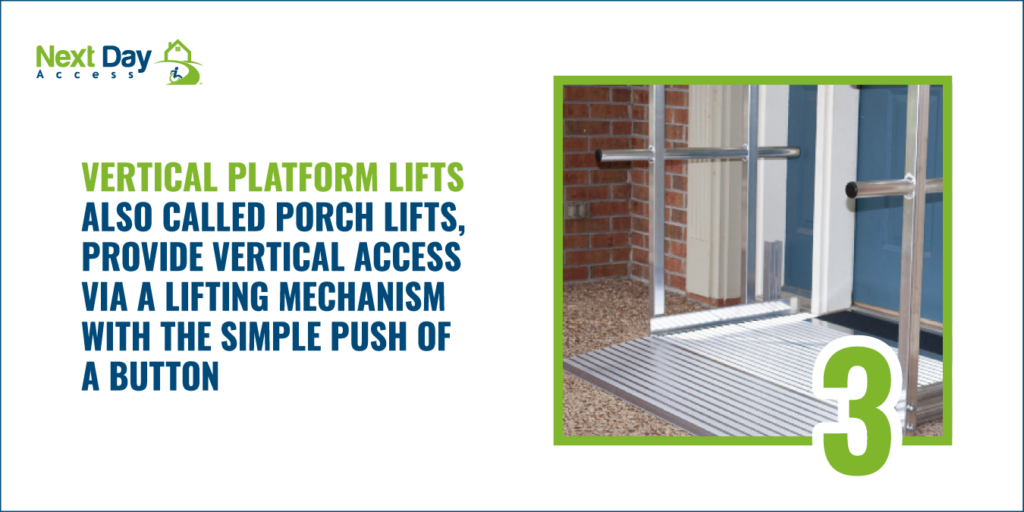

Modern accessibility equipment for specific needs goes beyond stair lifts and wheelchair ramps. You can get access to elevated areas with vertical platform lifts, and you can make your house more accessible with widened doors and grab bars in bathrooms. The diversity of accessibility equipment in today’s market ensures that individuals with mobility challenges can find the customized support they need to regain independence.
The Psychological Benefits of Accessibility
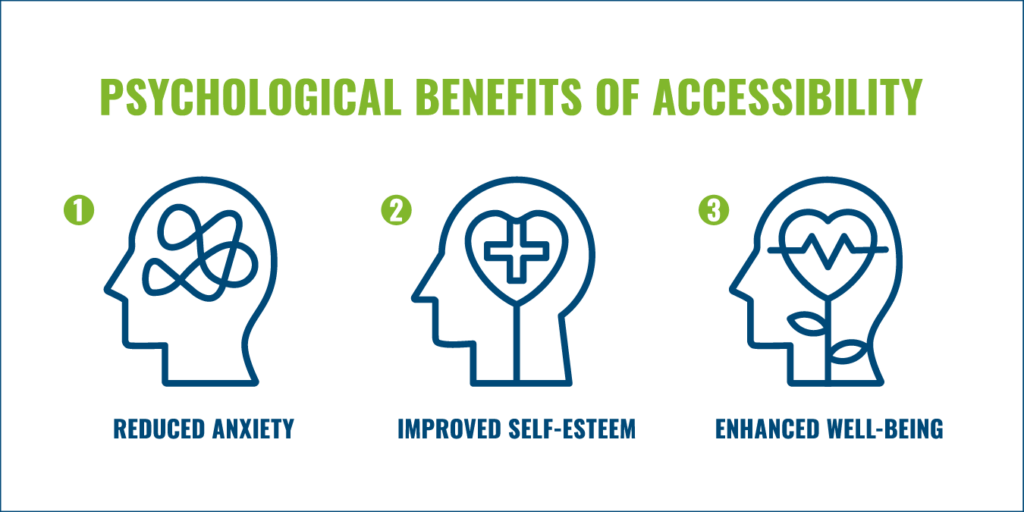
The psychological benefits of increased mobility and accessibility are wide-ranging, impacting many aspects of mental health.
Reduced Anxiety
For people with limited mobility, everyday tasks can become a source of anxiety and stress. It’s easy to get anxious when you’re nervous about falling on the stairs or unable to get to essential spaces. This chronic stress can have a negative impact on mental health over time.
Accessibility solutions like stair lifts and wheelchair ramps alleviate these anxieties by providing a safe and reliable means of movement. Stair lifts, for instance, eliminate the fear of falling on stairs, providing security and peace of mind. Wheelchair ramps remove the stress associated with navigating obstacles, ensuring individuals can access spaces without worry.
Studies have shown that increased mobility through such solutions can reduce anxiety levels. A study published in the Journal of Applied Gerontology found that seniors who used mobility aids like stair lifts reported lower anxiety and improved overall well-being compared to those who did not have such aids.
Improved Self-Esteem
One of the less-discussed but still significant psychological benefits of accessibility solutions is the positive impact on self-esteem. Limited mobility often leads to independence loss, making individuals dependent on others for assistance. This dependency can lower self-esteem over time, leading to feelings of inadequacy and helplessness.
Accessibility solutions empower individuals to regain control over their lives, fostering self-worth and competence. When individuals can independently access different levels of their homes or navigate their surroundings, they gain confidence in their abilities. This newfound self-esteem has a ripple effect, influencing other aspects of their lives positively.
Enhanced Overall Well-being
Increased mobility has psychological benefits beyond reducing anxiety and improving self-esteem. They are part of a broader concept of overall well-being. When individuals have the freedom to move without limitations, it positively impacts their mood, outlook on life, and sense of fulfillment.
Studies have shown that individuals with greater mobility report higher life satisfaction and happiness. Improved mobility allows people to engage in social activities, pursue hobbies, and maintain an active lifestyle, all of which contribute to a more fulfilling life.
Individuals with access to mobility solutions not only experience better psychological well-being but also tend to have stronger social networks. This social connection further bolsters their overall well-being.
Journal of Health and Social Behavior
Celebrating World Mental Health Day

Observed on October 10th of each year, World Mental Health Day serves as a global platform to raise awareness about mental health issues and promote mental well-being. Its theme this year is “mental health is a universal human right.” This day aims to enhance understanding, elevate consciousness, and inspire initiatives aimed at advocating for and safeguarding mental health as an inherent and universal human entitlement.
World Mental Health Day is more than just a date on the calendar. It represents a collective effort to break the stigma surrounding mental health and foster a more compassionate and understanding society. Established by the World Federation for Mental Health in 1992, this day has grown in importance, with governments, organizations, and communities worldwide coming together to address mental health.
World Mental Health Day is marked by a wide array of events and initiatives aimed at promoting mental well-being. Public events about mental health are being held on October 10th by various organizations and advocacy groups. There are workshops, webinars, and seminars to help people learn and get support.
Improving Mental Health Through Independence
This year’s theme is “Mental health is a universal human right”. The theme aims to address the fundamental notion that mental health should be regarded as an inalienable entitlement for all individuals. It underscores the importance of ensuring that mental well-being is not just a privilege but a right accessible to everyone on this planet. This theme resonates with the core values of Next Day Access, which is dedicated to making accessibility and independence a reality for everyone.
Individuals with mobility challenges often face physical barriers, but mental and emotional hurdles due to their limited mobility. This year’s theme emphasizes the importance of breaking down these barriers. It focuses on ensuring that individuals with mobility limitations have equitable access to mental health resources, support, and a sense of well-being.
Accessibility solutions, including stair lifts and wheelchair ramps, play a critical role in realizing this universal human right. By providing individuals with the means to overcome physical obstacles and regain independence, these solutions contribute significantly to their mental health and overall quality of life.
World Mental Health Day serves as a pivotal moment to recognize and address mental health issues. There are initiatives like the “Let’s Talk” campaign, which encourage open discussions about mental health. World Mental Health Day is global. Individuals and communities worldwide have the opportunity to participate and contribute to the cause.
Promoting Mental Health Through Accessibility
Accessibility solutions don’t stop at just one person; they can actually boost mental health across an entire society. When we talk about promoting accessibility, especially in terms of mobility solutions, we’re not just talking about a few benefits. It’s a game-changer for mental well-being on a broader scale. By creating environments that welcome everyone, we’re building a culture of empathy, understanding, and support. And this leads to some pretty great stuff:
- Less Stigma: When we make places more accessible, like adding ramps or elevators, we’re basically saying, “Hey, everyone’s welcome here!” This helps break the stigma often linked to disabilities. Imagine a world where everyone feels they belong, no matter their abilities.
- More Empathy: Picture this: You’re in a wheelchair, and you roll into a place where everything’s easy to access, thanks to ramps and wide doorways. It makes you think about what others might experience. That kind of insight can lead to people being more understanding and supportive.
- Happier Caregivers: Taking care of someone with mobility challenges can be tough. But when we have accessible solutions in place, like stair lifts or home modifications, it lightens the load for caregivers. They can breathe easier knowing their loved ones have the mobility support they need. That’s helpful for everyone’s mental well-being.
- Tighter Communities: Think of a neighborhood where everyone can join in on the fun because there are wheelchair ramps and accessible public spaces. Accessible spaces help build a sense of community. When people are able to easily participate in social activities, it makes the whole community stronger. It makes the community feel like a big, welcoming family.
Initiatives, Organizations, and Campaigns
Beyond Mental Health Day, a significant number of initiatives, organizations, and campaigns are dedicated to advocating for increased mobility. They raise awareness about the intersection of mobility and mental health. These entities play a vital role in driving positive change in society.
Accessible Cities
Many cities and urban planners are actively working to create accessible environments. Initiatives like “Age-Friendly Cities” and “Universal Design” focus on making public spaces and transportation systems inclusive for individuals of all ages and abilities.
Nonprofit Organizations
Various nonprofit organizations are committed to improving accessibility and mental health. Organizations like The National Alliance on Mental Illness (NAMI) work tirelessly to raise awareness. They also provide resources and advocate for individuals with mobility challenges and mental health concerns.
Awareness Campaigns
Campaigns like “Accessibility Matters” and “Mobility for All” leverage social media, educational programs, and community engagement to highlight the importance of accessibility and its positive impact on mental health.
Research and Education
Academic institutions and research centers conduct studies exploring the relationship between mobility, accessibility, and mental health. They provide valuable insights and contribute to evidence-based practices in these fields.
By shedding light on these initiatives, organizations, and campaigns, we recognize the collective efforts to promote mental health through enhanced accessibility. These efforts not only benefit individuals with mobility challenges but also contribute to a more compassionate and inclusive society where mental well-being is prioritized for all.
Improve Mental Health With Increased Accessibility
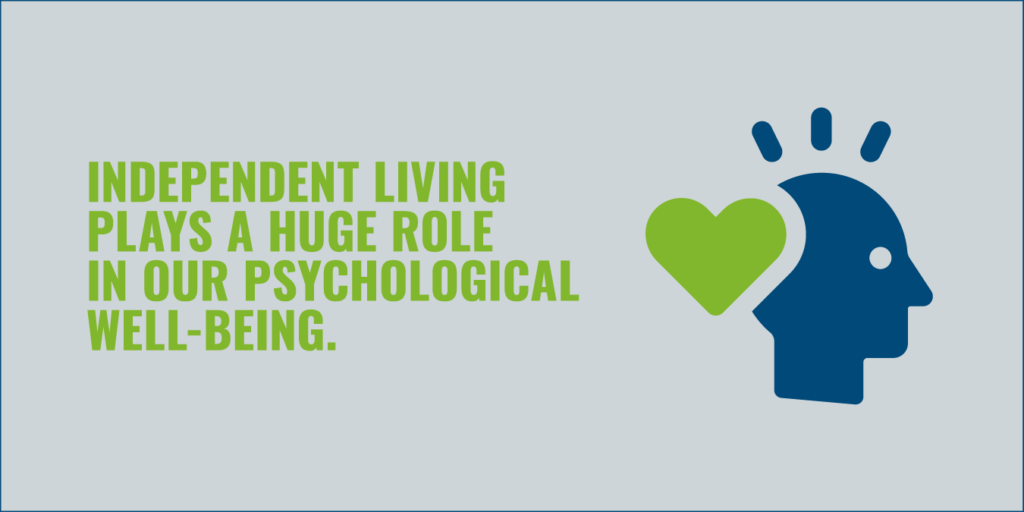
Independent living plays a huge role in psychological well-being. When this basic need is met, it has a profound positive impact on mental health, as it allows people to move freely and access spaces without obstacles.
Inclusion and accessibility go beyond individual well-being; they foster a society that’s empathic, supportive, and understanding. Accessibility and mental health awareness are at the forefront of societal change thanks to a variety of initiatives, organizations, and campaigns.
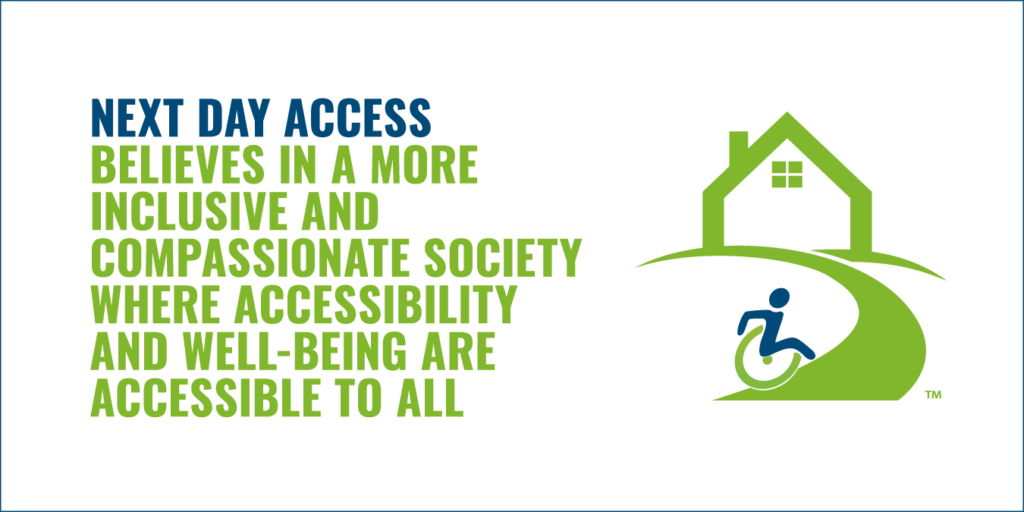
Having access to mobility solutions should be a basic human right, not just a fancy extra. In doing so, we’re able to make a big difference in mental well-being for people with mobility challenges, as well as society at large. We encourage our readers to get involved! Whether it’s finding mobility solutions for themselves, or supporting mental health initiatives in their communities. As a result, we make the world a better place for everyone to live with increased mobility, independence, and mental health. Together, we can create a more inclusive and compassionate society where accessibility and well-being are accessible to all.





